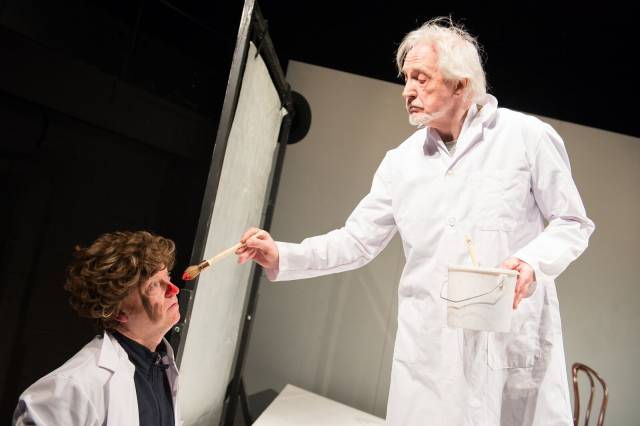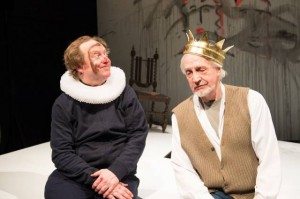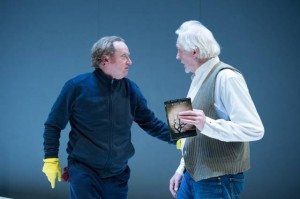

My interview with the lovely Edward Petherbridge was a refreshing reminder that age and illness are no limitations when one is passionate about one’s art. The 78-year-old, Tony Award-nominated actor has played such memorable roles as Newman Noggs in Nicholas Nickleby, Charlie Marsden in Strange Interlude, and the Fool in King Lear and created the role of Guildenstern in Tom Stoppard's Rosencrantz and Guildenstern Are Dead. When a stroke in 2007 precluded him from playing King Lear, he turned the experience into a show, My Perfect Mind, currently at 59E59 Theaters.
How did the concept of My Perfect Mind come about?
When [co-star] Paul [Hunter] and I met for the first time, we were both cast in an ill-fated revival of The Fantasticks, which is still running on Broadway. The idea was to take it to a small theater in the West End. We were both cast in it. We’d never met each other. There was a rather classy photo shoot with us all in nice clothes and things before we’d even come to work on it, and that’s where we met. I was thinking who is this guy who is playing this very important part that doesn’t speak but is absolutely hitched to me as my sidekick, and on whom everything depends that we should be able to work together. We were none the wiser after that meeting really, and we were very polite to each other. Afterwards we did our first rehearsal, and from the word go we found we could work together as a duo and it was kind of magical really. We were very lucky because the show was generally panned. I think I would be right in saying we were a flash in the pan as it were. So that was lovely for us and sad for the musical, which really got very harsh treatment. So I was in the wings one night, and this was after I’d had a stroke and couldn’t do King Lear, and I said to Paul, "Do you think we might dream up a kind of two-man version of King Lear done by the Fool and Lear and we can perhaps use some puppets or something, something fringe-like." Paul said, "I think there’s a much better show to be done, based on the idea of you not getting to do Lear after the stroke and everything." I thought, what a curiously dreadful idea that is (laughs). But that turned out to be what the show is based on.
You collaborated with Paul and Director Kathryn Hunter on the script. Did you improvise a lot of the show?
It’s funny you should ask about our collaboration on the script because I never think of the show as having a script. Nobody’s pen or laptop spun any words, it was all done through the improvisation process. It strikes dismay into the heart of somebody who’s seen a lot of devised shows or even been in them and thinking (laughs), oh my god, another devised piece. But we somehow... I hesitate to say we struck gold, it’s not for me to say that. Shall we say it sort of began to work. We didn’t have very long. Paul and I had one or two workshops together in a matter of two or three days here and there. I suppose we might have had workshops that took about... if we had ten days’ workshop I would be probably overestimating. Eventually we decided we could go ahead and he had a company called Told By An Idiot and he could make things actually happen. We took Kathryn on board and had a proper designer, a rehearsal room, and we had our design after a few conversations. Right from the word go, we had a strange platform that we worked on, which is a curious slope. We had about four or five weeks only to come up with a finished show, which miraculously we did. It was a playful time. We were both very concerned that we shouldn’t do anything that would have a smack of documentary about it. It needs to be playful and very un-literal, very unlinear.

Where did the idea for the raked stage come from? It was a very striking set piece.
It was a borrowed idea almost. When we played in The Fantasticks, there was a similarly sloping rake that went down towards the audience, and it had a trap door in it through which we entered. So we thought we’d like to replicate that but the designer thought it might be better if it went across instead of slanted toward the audience, and it would be a different way of looking at it. We’re all used to seeing it sloping towards us, slipping across us might be more fun. It makes acting less straightforward.
It came by sea here. The last time we did the show was in Barcelona in early November, and so we hadn’t done it since. We had a few days of rehearsal in London on a flat floor, because the set had already left for New York. It only came on Tuesday, the day before we opened. But it was like seeing an old friend. Thank goodness we don’t have to do it on the flat anymore. (Laughs.)
The last brush I had with King Lear, I was in a company that came through the Brooklyn Academy of Music in 1973 I think, an English company called The Actors Company, and we brought King Lear with us. The only thing is the set and the costumes got held up in a storm or customs, or both. So we decided we had to open it without anything, just a flat stage, our own clothes, and no set. And, actually, it was never better. When the set and costumes arrived, it was slightly downhill all the way.
Being that My Perfect Mind is autobiographical, how much of your character “Edward Petherbridge” is you and how much of it is a character you created?
Don’t we all of us without realizing it play different versions of ourselves depending on who we’re with, whether you’re with a taxi driver or with an important producer or with a lover? There are slightly different versions of us anyway. I always say that real life has nothing to do with what goes on onstage. Of course there are various versions of me I suppose, including a version of me trying to do King Lear. I suppose in a way, I hope it’s not a caricature or a parody of me, but it’s certainly related to the real me, whoever that is. I suppose the real me is talking to you now.
You have a very measured, calm presence on stage. Does that come from years of experience or something you cultivated for this particular role?
Some critic used the word insouciance, saying, he plays the Shakespeare in his insouciant manner, his customary insouciance. In fact, I played it with a great deal of anger and energy a lot of the time. If it comes across as insouciant, that’s most unfortunate. But anyone would look insouciant compared to Paul Hunter, who has a very busy time playing everyone from my mother to Laurence Olivier, and everybody in between. There are a lot of people, so he looks very busy. So maybe I do look calm. I didn’t consciously try to find a special me. It all came out in the rough and tumble of the improvisation, the kind of risks we did. I was only conscious of adapting my personalities to whomever it was I was with. I wasn’t adapting my personality thinking this is how I’ll be in this bit. I was just reacting to whoever I was imagining. The self that one imagines one is when one is on a stage, it’s all imagination. So it’s bound to be that one has a default position, and sometimes it’s a rather unfortunate default position, a made up person that’s you on the stage. It’s the worst kind of trap to fall into. It’s an existential labyrinth and I can’t begin to talk about it...it’s a labyrinth I’ve got lost in already. I do my best is all I can say.

You and Paul seem to have a lot of fun playing with theatrical tropes and stereotypes. Like you said before, it was very playful.
People talk about it being meta. The thing about playing with the audience too soon is they don’t know quite where they are, even they seem to be recast from time to time in the show...that kind of playfulness that I think they enjoy and we enjoy too. I think it is unusually easy to keep this show fresh because it so seldom settles into one vein or another. It’s always on the move, the tone changes, the whole relationship with the audience changes. That keeps one on one’s imaginative toes. It’s been a few years since we started working on this. I’ve been finding since the stroke, rehearsal is rather tough. I don’t get a chance to sit outside because I’m always in the middle of things. I was worried that I would find this rather tiring, especially since we began to rehearse in a rehearsal room that took me an hour to get to and an hour to get home from, with five to six hours of work in between on my feet. I think the best thing you can do with someone who is getting on in years, and it’s a bit of a challenge, if it’s an actor, when you get into the rehearsal room... it’s that old thing tired old pros tend to talk about, Doctor Theater, the great therapist Theater. It’s like getting senior citizens to lift their arms and move their hips about in day centers. They’re better for it.
You are also a painter and a writer. Do these different art forms influence one another for you?
I suppose they must. I’m not really a proper writer because I’ve only written two versions of this theatrical autobiography [Slim Chances and Unscheduled Appearances] and I write a bit of poetry and I have a show where I spout poetry from memory. Again, one is a different person but the same when you’re doing these different things. They must influence one another but in what way I couldn’t possibly say. I think they’re all limited by the fact that they’re all done by Edward Petherbridge. Whatever strength they have comes from that truth. How they relate to each other is another labyrinth.
What are you working on next?
The big thing is that we are moving house out of London to a little town called Lewes, which is south of London in the country about an hour’s train ride from Victoria. So that’s taking a lot of time at the moment. There are a lot of irons in the fire that I couldn’t possibly tell you about because it would be a breach of security (laughs). They might not happen if I mention them. All I’m saying is that I have no thoughts of retiring at the moment. Other people might think it’s time for me to retire but I don’t agree with them.
"My Perfect Mind" is performed as part of Brits Off Broadway at 59E59 Theaters through June 28.